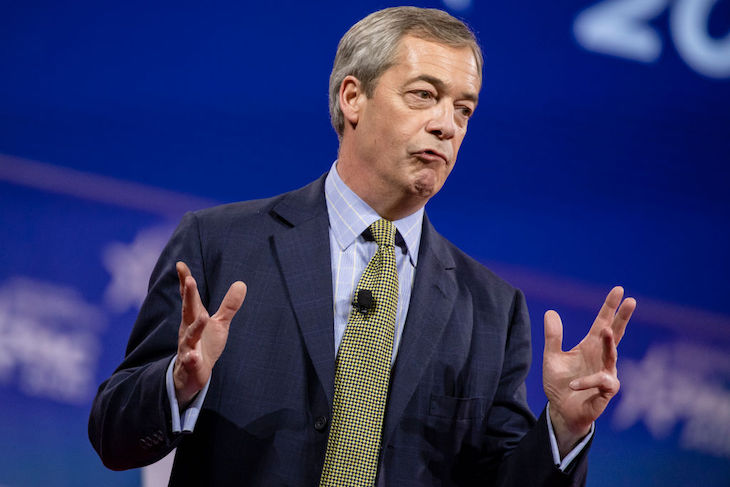Not for the first time in his colourful life, the perennial rebel Nigel Farage has the establishment on the run. This time it is the financial establishment and its media allies. The former Ukip leader has already garnered apologies over conduct or coverage from NatWest, which owns Coutts bank, the high-profile podcaster and former BBC man Jon Sopel, the BBC’s business editor Simon Jack and the chief executive of BBC News Deborah Turness.
Farage is currently circling NatWest chief executive Dame Alison Rose in the manner of a hungry shark who has scented blood in the water. Not his, but hers. Dame Alison appears to be Farage’s prime suspect in the leaking of confidential details about his financial standing. ‘I will find out the absolute truth about who leaked my personal financial details to the BBC,’ Farage has said.
He is also making a beeline for Coutts CEO Peter Flavel, whom he accuses of ignoring him. ‘Did he take the decision to close my account for political reasons? We need to know,’ Farage has demanded.
Messing with Farage is a dangerous business
The key lesson to be drawn from this episode is not just that messing with Farage is a dangerous business, but that his ability to connect with public opinion and shape the agenda has actually grown since Brexit. Partly this is down to the sheer number of hours of live TV broadcasting he has clocked up after becoming a GB News anchorman two years ago. He has learned to calibrate his utterances more carefully since his Brussels-bashing days, during which he once accused the then president of the European Commission Herman Van Rompuy of having ‘the charisma of a damp rag and the appearance of a low-grade bank clerk’.
While it is high-grade bank clerks who tend to get the rough end of his tongue these days, he is as likely to deploy under-statement as exaggeration on his early evening show and has gained in authority and broadened his appeal as a result.
Before he got his teeth into shocking conduct within the banking system, it was he more than anyone else who pushed the issue of illegal small boat crossings of the Channel to the top of the news – to the point where it became a major electoral headache for the Conservative government. He can – and no doubt will – do the same in regard to the costs of achieving carbon Net Zero under the schedule inherited by Rishi Sunak from Boris Johnson.
The one mercy for the Tories is that Farage is currently out of electoral politics. One very senior Conservative MP told me recently that Rishi Sunak feels that his right flank is fairly safe at the moment, with none of the challenger parties such as Laurence Fox’s Reclaim or Richard Tice’s Reform gaining much traction or momentum. But this person added: ‘Were Farage to go and lead Reform again then that would be something which would greatly concern the Prime Minister.’
It is not overdoing it to say that Nigel Farage has it within him to make certain that the Conservatives are badly defeated at the next general election. There are sufficient important issues on which he has become the standard bearer for staunch conservative views – from immigration to taxation, ECHR membership and the importance of resisting the relentless advance of leftist wokery – to ensure any party led by him would gain a double-digit vote share. Farage achieved that before in a general election as Ukip leader in 2015 and it just so happened that in key battleground seats this hampered Labour as much as it did the Tories. That is not likely to be the case in 2024. It is overwhelmingly people who voted Conservative in 2019 who respond favourably to his stances.
Whether he chooses to jump back into the fray this time or not, it hardly seems sensible for the Conservatives to have to deal with an uncontrollable ‘Farage Factor’ every time they approach an election. Binding in a figure who was, after all, a Tory member until the great schism caused by the Maastricht Treaty would surely be a cannier approach.
While the very idea will bring ‘liberal’ Tories out in hives, it is no longer unthinkable that the Conservatives might soon be led by someone who chooses to harness his appeal by inviting him into the tent. Home Secretary Suella Braverman, for whom he has a high regard, is the most plausible such figure.
Perhaps the political price he would demand would be too high for her to pay, but the costs he can inflict on the Tories by running a rival ticket are also extremely high. And they do not seem to disagree about very much to me.







Comments